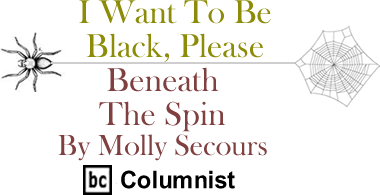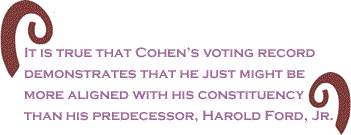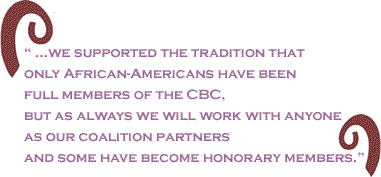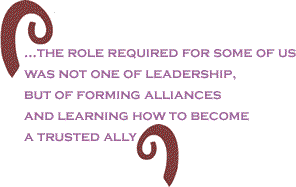
|
|||||||||||||||||||||
 |
|||||||||||||||||||||
 |
|||||||||||||||||||||
 |
|||||||||||||||||||||
 |
|
|
Nearly 50 years ago, the legendary comedian Groucho Marx puffed on a cigar while raising his eyebrows and joking “I refuse to join any club that would have me as a member” and the world laughed at the absurdity (and irony) of his declaration. Just as absurd, but not as amusing, is insisting that you be allowed to join a club that would no longer be the organization it is, were you to become a member. Several months ago, while campaigning in the predominately Black district of Memphis (9th district), Tennessee Democratic congressman-elect, Steve Cohen pledged that he would seek to become "the first white member" of the Congressional Black Caucus (CBC). A strange promise for someone white, but a promise nonetheless. The congressional seat vacated by Harold Ford Jr. had long been coveted by Cohen, the native Memphian, who after losing to Ford Jr. in 1996, was quoted as saying "It is impossible for a person who is not African American to get a large vote in the African American community ... against a substantial candidate… The fact is, I am white, and it doesn't seem to matter what you do." Translation: gosh darn it, white guys just can't get a break! Ten years later Cohen is the first Jewish person ever sent to the House from a majority black district and the first white ever to apply to the CBC. Tennessean columnist Larry Daughtrey described Cohen as "probably the most liberal white member in the legislature," and "perhaps even more so than most of the black members." Unlike his predecessor Ford Jr., Cohen is very much on the left of most social issues, including support for civil unions, abortion rights, separation of church and state, and giving ex-felons the right to vote. And most impressively he has pushed for an income tax in a state that has for years been adamantly opposed to one. It is true that Cohen’s voting record demonstrates that he just might be more aligned with his constituency than his predecessor. In spite of the fact that Mr. Cohen promoted himself as the best candidate, and he may be because of his relationships and accomplishments within the predominately Black district, he maintains that in order to best serve them, he should be given special dispensation, allowing him to be a voting member of the Congressional Black Caucus, even though the main requirement of membership is being Black.
By that should we assume that although Mr. Cohen implied during the campaign that he didn’t need to be Black to serve a predominately Black district, that he has now changed his mind? Cohen is not the first white man to express interest in membership of an all-Black caucus. In September 2005, Rep. Stacey Campfield, a Republican, also white and from Tennessee, raised a ruckus about joining the General Assembly’s Black Caucus, claiming that in order to better represent his minority constituents, he should be permitted to join. After failing at his insincere attempt, and getting four and a half minutes of fame on Fox News, Campfield likened the group to the KKK. As told to the Associated Press, his “understanding is that the KKK doesn’t even ban members by race.” He added the KKK “has less racist bylaws” than the Black Caucus. All of this was done under the guise that Mr. Campfield was only concerned about his minority constituents and wanted to know more about their issues. The Tennessee Black Caucus offers an “honorary membership” for "those persons whose beliefs and actions contribute to the purpose for which this caucus was formed". Needless to say, Campfield’s intentions were not deemed “honorable” and he was duly declined.
Unlike Campfield, Mr. Cohen’s intentions don’t
seem questionable and he has certainly not verbally assaulted (or
insulted) the very organization he wants to join. And unlike Campfield,
Cohen’s past record indicates that he does indeed care about
the interests of his African American constituency, and by most
accounts, he is thought a worthy and dedicated public servant.
There are caucuses for Women, Latinos, Asians, Muslims, Jews, African descendants - all, who for obvious reasons, have formed organizations and coalitions for the very purpose of creating environments that are supportive and safe, and are not encumbered by a dominant majority-influenced agenda. Will Mr. Cohen and other males who represent minority districts be requesting membership to the Congressional Women’s Caucus so they can fully understand the needs of their female constituents? Probably, not. Several years ago, at the World Conference Against Racism in Durban South Africa, there were hundreds of caucuses formed throughout the two weeks and anyone in attendance would be hard pressed to deny the power harnessed when those with common histories and experiences joined forces. It was palpable. As the only non-black member of an NGO delegation, it was challenging not to resist and resent being excluded from caucuses where those who were ‘classified as white’ were not invited. But very quickly, it became evident that the role required for some of us was not one of leadership, but of forming alliances and learning how to become a trusted ally. The ultimate challenge was serving, rather than driving, the agenda. A novel concept for someone accustomed to steering the wheel. Dr. Ray Winbush, Director of the Institute for Urban Research at Morgan State University in Baltimore admires Cohen for his public service and says: “Frankly, it is surprising and disappointing that Steve isn’t more sensitive, especially with his being Jewish. Of all people, he (Cohen) should understand the importance of ethnic caucuses where strategies can be formed. Creating allies and solidifying relationships in Washington with members of the CBC is more important and respectful than requiring membership.” And so now it seems that someone at the Congressional Black Caucus will draw the short straw and have to take Mr. Cohen to lunch and gently ‘break it down’ for him and explain why perhaps it is inappropriate that he be admitted to the CBC and how many people of color might find his assertion and insistence offensive. Not a pleasant task when you consider that many of us liberal white folks don’t like being told we aren’t ‘allowed’ and don’t take kindly to exclusion. Unfortunately for Mr. Cohen, requesting that he become a member of the Black Caucus only raises questions as to his ability to truly understand the needs of those he represents and what their struggles are. If he doesn’t grasp the value of the Congressional Black Caucus as a Black organization and instead allows his desire to be ‘the exception’ to override his good judgment, he may raise more than eyebrows on Capitol Hill. Molly Secours is a writer/filmmaker/speaker and frequent co-host on “Behind The Headlines” and “FreeStyle” on 88.1 WFSK in Nashville. She can be reached at www.myspace.com/mollysecours or www.mollysecours.com. Click here to contact Ms. Secours. |
|
| Home | |
| December 7, 2006 Issue 209 |
||||||||||||||
|
||||||||||||||
| Printer Friendly Version in resizeable plain text format | ||||||||||||||
 |
||||||||||||||
|
||||||||||||||
 |
||||||||||||||
 |
||||||||||||||
 |
||||||||||||||
 |
||||||||||||||
| |
||||||||||||||
| |
||||||||||||||






























